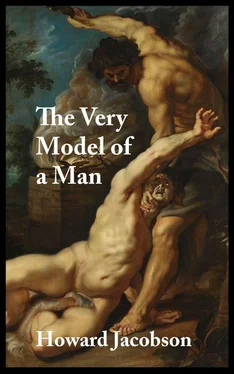Naaman thinks Cain is too touchy for his own or for anybody else’s good, and wonders how his daughter…
‘I understand,’ he says, ‘I understand. A man cannot be too prudent or too premature in the arrangements he makes for his retirement. And as I say, I may have something that will answer.’
‘My expectation has been to build my own.’
‘I never knew,’ says Naaman, ‘that you were an engineer.’
‘I am not, though of course my father —’
‘Or a mason.’
‘I am not.’
‘Or an architect.’
‘I am not. But expertise of these kinds can be bought.’
‘Why bother? Why pay their prices? There is a ziggurat at the southern end of the city, on the road to Larsa, on which work has been languishing for a while — don’t ask me why — priestly wranglings, I suppose. I can’t recall which god it is consecrated to, if any, but there would be no objections to you making it over to your own, or to yourself if you prefer. We are easygoing about such things here, as you know. I can’t vouch for what state it’s in, but I’m told the foundations have been dug, and if I’m not mistaken there is even a storey or two completed. You do the rest. Build as high as your fancy or your ambition takes you.’
‘I am not an engineer,’ Cain reminds him.
‘You don’t need to be. The city’s full of them. And one’s bound to be on the site anyway. Asleep, but on site. All you’d have to do is see he stays awake.’
‘I am to be a sort of foreman?’
‘Nnnn…’ Naaman squeezes his womanly lips together. Foreman is not the word he would use.
‘Caretaker, then?’
Naaman still isn’t happy. He likes to be precise about these things. Clear from the beginning. He lays a finger along the bridge of his nose, drops an eye, pops his cheeks. At last the imp of acuity can be seen dancing again across his face. ‘I have it,’ he says. ‘Presiding genius.’
Cain decides against asking the reason for Naaman’s liberality. Or his mirth. But he does have one question: ‘May I take time to consider this?’
Naaman appears nonplussed. Is he not offering Cain the painless realisation of the foremost of his desires? Naturally, he is too gracious even to think of pointing this out. ‘Heavens, yes,’ he says instead, after a pause. ‘Tell me later this evening — after you have finished burying your brother.’
The briefest silence between them. Nothing threatening to good relations.
‘By time,’ Cain says, ‘I did mean something more like weeks.’
Naaman’s long, lovely hands, smelling of camphor and camomile, appear once more, as though they have flown there, on Cain’s shoulder. Cain knows he must not inhale, must think of the smell of sea or snow, if he is not to swoon.
‘I think things have to be settled sooner than that,’ Naaman says.
Cain wonders where the hurry is, given that the ziggurat is and has been lying idle for some time, and no god is thundering for its completion. ‘Things?’ he queries.
Naaman sighs. It is the sigh of a man who would much rather smile. Why do you make me do this, the sigh says, when our natural medium, you and I, is laughter? Naaman himself says, ‘This business over the poet puts pressure on all of us.’
Cain is aware of the business he is referring to. News of Preplen’s mishap has not exactly ripped through the city of Babel like wildfire — Shinarite consciences would rather be touched by romance than reality, by princes than by poets who sing satirically of princes — but he has heard it carelessly brought up, sometimes as an example of the increasing hazardousness of the streets, sometimes with a fatalism he would feel to be callous, were he in the business of feeling anything about it at all. ‘Too bad… but they come here to escape from worse… and given how fast they breed one less is hardly a catastrophe…’
Cain cannot swear that this is what he has heard. He fears it is not impossible he is hearing with Preplen’s ears. The market places of Shinar rejoicing over his demise… the heathen populace of Babel deaf to the orphaned cries of Jabal, Jubal, Tubal, Gether and Mash, the widowed wails of Nanshe/Naomi, marooned without a helmsman in her furniture… or worse, or better, bent on refilling his shrine to Law and Family with feathers, bones and partridge semen — why, not in his blackest, happiest hours could Preplen have arranged himself a more exemplary final outcome. ‘See!’ Cain can picture him rejoicing, his neck twisted away from a sky he no longer has to scan for ill-intentioned birds, ‘see what I told you! Next time it’ll be you. Since you don’t intend to struggle, since you’re convinced they love you really, at least be certain you’re bathed and barbered for them when they come.’
It is in order not to attend to Preplen’s vindicated voice that Cain remains unsure what sentences he has heard uttered in the streets. He would not want to swear that he has heard what he has heard. But then again he would not want to swear that he has not.
In this way he substitutes a lesser equivocation for a greater — concedes confusion of the senses rather than the affections.
But if he is unsure what he’s sure of, he is at least sure of what he isn’t. He isn’t sure of the implication for him of Preplen’s decease, and isn’t sure of its bearings here, now, on Naaman’s offer of a place of high retreat. Unless Naaman means to round up for their own safety those who may be thought to be in comparable danger of attack — Preplen’s… Preplen’s what?… Kind?… Tribe?
Cain shakes the idea from his mind. What’s he to Preplen!
‘I do not see,’ he says, ‘how the business of the poet affects me or the timing of my decision.’
Naaman does not want to enter into this. How can he communicate to Cain his extreme unwillingness and fatigue? How can he express his indifference to the niceties of detail and contingency? ‘Look,’ he says, falling heavily against Cain, as though himself pushed by the shoulder of confidentiality — ‘you know what rumour is. You, above all people, know how stories start. If I tell you there are one or two abroad who think they saw you, or your shadow, at more or less the time, in more or less the vicinity, looking more or less intent…’
Does he have to go on? Does he need to say more about the variable surmises of approximate attestants?
‘Saw me?’
‘Saw you… saw your shirt… saw the soles of your sandals…’
Something returns to Cain. A recollection he would as soon dispel, of waking naked in a filthy room, hungry in a house where there was only God to eat.
Even to himself he will not name Sisobk. And what then is he to plead to Naaman? The impertinence of the imputation? The wild irresponsibility of the slander? Is he to say, ‘Who? Me? A murderer!’
Naaman is relieved to see that Cain has fallen quiet. He doesn’t believe his nerves would stand for noisy protestations. ‘As you must have noticed, we set no limits to ambition in the construction of our temples,’ he says. ‘You are welcome to build to whatever height you have a head for. Make a name for yourself. Pierce the heavens.’
17. Cain Accepts the Protection of Y-H-W-H
The ravens came.
We sat so quietly, my brother Abel and I, that they dared approach us, their hop hideous, their eyes scorched with greed.
We had heard bad things of ravens. They had so little regard for one another, were so disgusted by the idea, let alone the fact, of their own propagation that they mated contemptuously, the male impregnating the female orally, by firing spittle in her mouth. They were also envious to their souls. Hence their foolish gait. Jealous of the graceful deportment of other birds, they had lost whatever was natural to themselves in a scramble of inept mimicry — now trying to strut like an ostrich, now trying to make an entrance like a swan.
Читать дальше











